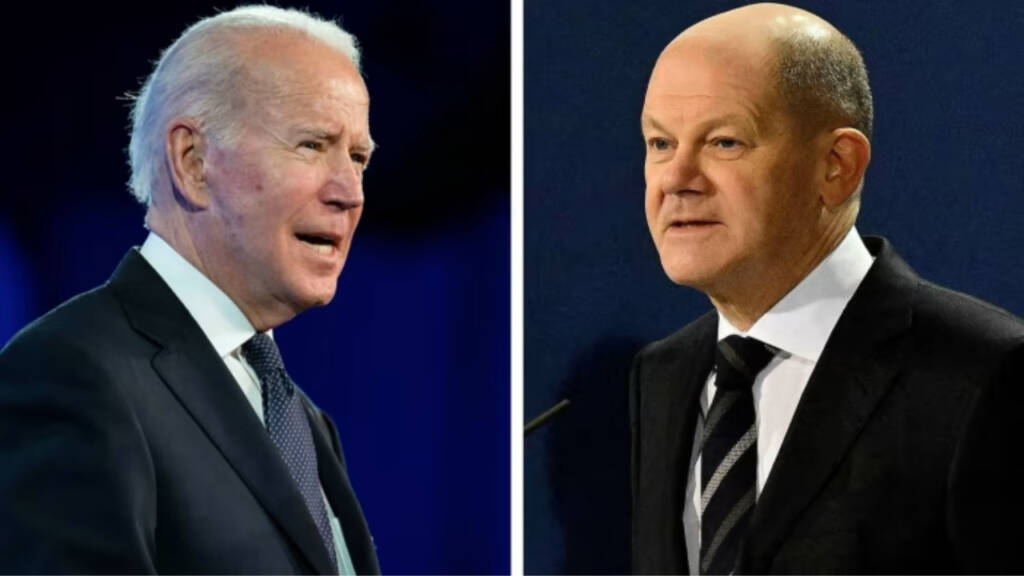As the first echoes of conflict reverberated in Ukraine, the US swiftly aimed its sanctions crosshairs toward Russia, urging its Western allies to lock arms in a united front. Yet, amidst this fervent call to action, a shadow of doubt crept in, haunting the corridors of American diplomacy. The fear loomed large: would the European powers heed this call or would they dance to a different tune? President Biden, with steely resolve, proposed sanctions, aware that the European allies, especially Germany, might hesitate to march in lockstep. His concern stemmed from the potential wavering of Scholz, whose constituency’s lukewarm support for Ukraine hinted at potential discord. With the biting chill of winter looming, the specter of prioritizing the warmth of homes and the prosperity of industries casted a shadow over the unwavering support for Ukraine against Russia.
Join us on Telegram: https://t.me/tfiglobal
Soon that worry turned real. Scholz and his pals in Europe got tangled up in worrying about their own energy safety. They were stuck in a tight spot, torn between what they wanted to do and what they felt they had to do to keep their homes cozy and their industries running smooth. The big idea of slamming Russia with energy penalties hit a roadblock because they were too busy looking out for number one. But in the middle of all this sticky diplomacy, President Biden, a master of backup plans, started thinking up a different way to deal with this crazy world map of politics.
Read More: EU’s Russian Energy Love Affair: Even Sanctions couldn’t Break the Spell!
He greenlit an attack on the Nord Stream. Yeah, you heard that right! See, this move wasn’t just about Russia; it was a direct jab at Germany, believe it or not! According to investigative hotshot Seymour Hersh, Biden’s crew was sweating bullets over Germany not playing ball during the whole Ukraine commotion. So, in a jaw-dropping turn of events, the decision to wreck those crucial pipelines was all about giving Germany a nudge in the right direction, or maybe the American direction, you could say.
In a juicy scoop unveiled on his Substack blog last Friday, Hersh spilled the beans about this pipeline saga. Get this: way before the whole Russia-Ukraine showdown in February 2022, Biden’s secret squad had the pipeline sabotage plan in motion. These undercover American agents were all in, thinking they could scare Moscow off its game. But wait, there’s a twist! The attack prep was all set by late May, but then Biden slammed the brakes on it at the eleventh hour. Instead, the team’s mission shifted gears—they were told to sneakily plant explosives on those pipelines, set to go kaboom later on. And guess what? When the fireworks finally went off in late September 2022, it looked less like a jab at Moscow and more like a direct shot at Berlin! Yep, seems like the timing was more about sending a message across the pond than anything else.
“Biden’s timing seemed aimed at Chancellor [Olaf] Scholz. Some in the CIA believed that the president’s fear was that Scholz, whose constituents were lukewarm in their support for Ukraine, might waffle with winter coming on and conclude that keeping his people warm and his industries prosperous was more important than backing Ukraine against Russia,” Hersh wrote.
Not to mention, the annihilation of those pipelines dealt a severe blow to Germany’s economic prowess, marking a stark departure from its once-dominant position in global markets flaunting luxury cars and top-tier industrial gear. This catastrophe ushered in what some dub as a lightning-fast deindustrialization phase for the nation. But wait, there’s more fallout from this economic earthquake! Germany’s political landscape has witnessed a seismic shift too. The surge in support for right-wing factions like the Alternative for Germany (AfD) has been fueled, in part, by the nation’s economic downturn. It seems that as Germany grapples with financial turmoil, the political pendulum swings towards these movements, signaling an intricate dance between economic struggles and political transformation.
Read More: Bold Prediction! Germany to Revive Nord Stream 2 Very Soon
The aftermath of Biden’s strategic moves left Germany reeling in an economic downturn that echoed across its industries. This economic upheaval wasn’t merely a financial crisis; it became the harrowing landscape where the recession took root, weakening the economic foundations and denting the nation’s once-unassailable position in global commerce.
Biden’s actions in targeting the Nord Stream pipelines caused a big economic hit for Germany. This wasn’t just about politics—it put Germany in a tough spot financially. The move basically messed with Germany’s industries and made things worse.
Recommended Video:
